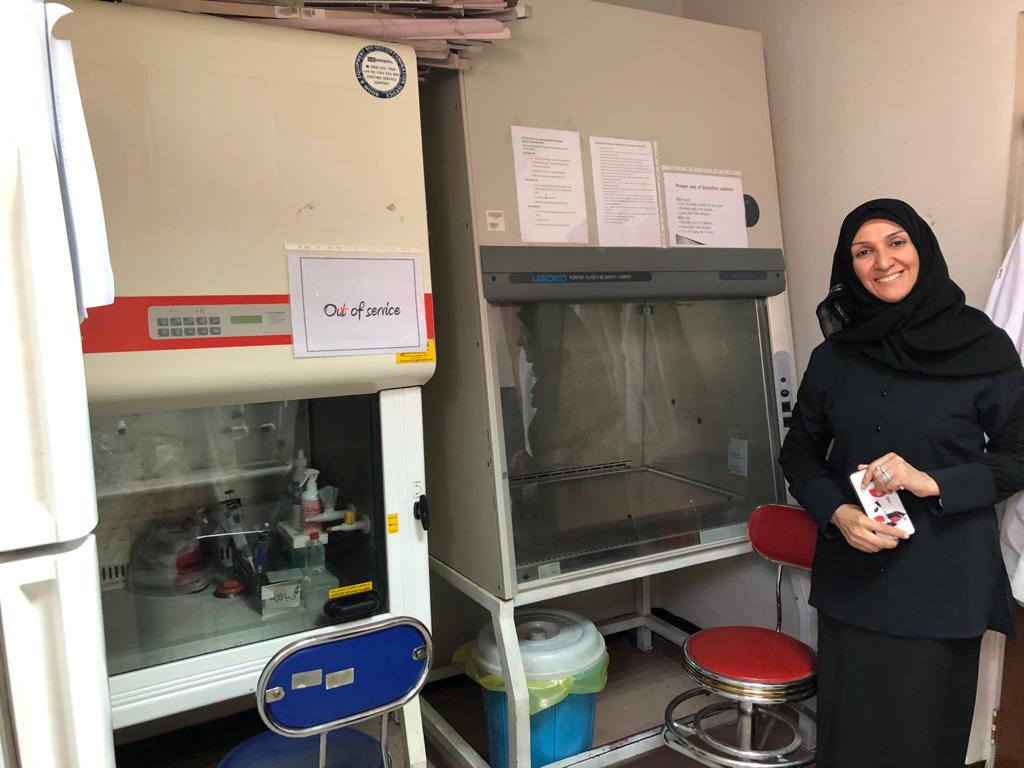 WHO supported Iraq to strengthen laboratories’ capacities to test for influenza viruses. Photo: WHOCairo, 23 February 2022 – In recent months, with support provided by WHO under the Pandemic Influenza Preparedness (PIP) Framework Partnership Contribution mechanism, national sentinel influenza surveillance, preparedness and response system in Iraq has been strengthened during the ongoing COVID-19 pandemic.
WHO supported Iraq to strengthen laboratories’ capacities to test for influenza viruses. Photo: WHOCairo, 23 February 2022 – In recent months, with support provided by WHO under the Pandemic Influenza Preparedness (PIP) Framework Partnership Contribution mechanism, national sentinel influenza surveillance, preparedness and response system in Iraq has been strengthened during the ongoing COVID-19 pandemic.
Iraq has faced critical political, economic and health challenges in recent years that have affected its health system and had a negative impact on the health of its population. Political instability, competing health priorities and lack of financial and human resources have also resulted in the disruption of the influenza sentinel surveillance system.
The electronic-based Early Warning Alert and Response Network (EWARN) used in Iraq enables national surveillance teams and health experts to conduct real-time surveillance and promptly respond to epidemic-prone diseases during the period of emergency. However, the system provided limited information. There was also limited capacity to conduct virological testing for seasonal influenza and other respiratory pathogens, highlighting limitations to efficiently and effectively detect seasonal influenza activity and prepare for any potential future pandemics of viral respiratory pathogens.
Early in 2020, Iraq joined the group of priority countries in WHO’s Eastern Mediterranean Region that benefit from PIP Partnership Contribution funds to improve influenza surveillance and pandemic preparedness and response systems. These countries are Afghanistan, Egypt, Jordan, Lebanon, Morocco, Somalia, Sudan, Syrian Arab Republic and Yemen. Under PIP support, countries are strengthening their capacities and systems in the areas of influenza laboratories, epidemiological surveillance, burden of disease, deployment, regulatory work, and risk communications and community engagement.
As a result of investment under the PIP Framework and Partnership Contribution, Iraq has been able to build up its influenza sentinel surveillance system with technical support from the WHO Regional Office for the Eastern Mediterranean. The support was extended to strengthen laboratories’ capacities enabling them to test for influenza viruses and SARS-CoV-2 using rt-PCR assays.
WHO also equipped public health laboratories across the country with necessary equipment and provided laboratory supplies for the molecular detection of seasonal influenza. It also provided support to conduct surveillance for severe acute respiratory infections (SARI) and influenza-like illnesses (ILI) and participated in national training that built the capacity of health workers at sentinel sites for the efficient implementation of sentinel influenza surveillance systems and initiating weekly data sharing. Technical support was also provided to develop a national surveillance protocol following a global strategy that it is based on the concept of integration of sentinel surveillance for influenza and other respiratory viruses with epidemic and pandemic potential.
In a step to ensure that the country makes progress in the detection and diagnosis of seasonal influenza and that it contributes to WHO's network of Global Influenza Surveillance and Response System (GISRS), data managers at the Ministry of Health were trained to collect and report SARI/ILI epidemiological data. The country is now periodically sharing data to GISRS through WHO’s FluNet and EMFLU online platforms. At the same time, the team at the national influenza centre is trained to report virological data to FluNet.
During 2022 and 2023, and with the support of the PIP Partnership Contribution funding mechanism, WHO will continue to support the Government in strengthening and maintaining the functionality of the sentinel-based surveillance systems for seasonal influenza and building the capacities of epidemiological and virological surveillance for influenza and other epidemic- and pandemic-prone respiratory viruses. This will ensure the timely sharing of data and viral isolates with WHO collaborating centres across the world for vaccine strain selection, as well as the early detection and response to the emergence of any novel viral strains.
Related links
Identifying challenges and solutions for pandemic influenza preparedness in the Region
Strengthening Iraq’s influenza surveillance system


